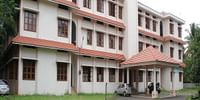Ph.D. (English)- Full Time
Doctor of Philosophy in English Top Colleges, Syllabus, Scope and Salary
Ph.D. in English is a 2-year doctorate degree in English, essentially consisting of research work. Upon completion of the course, for procurement of the degree, scholars ae needed to submit a detailed thesis. The advanced course in English literature comprises literature not only by authors from England, but from across the globe. For instance, Robert Burns (Scottish), James Joyce (Irish), Joseph Conrad (Polish), Dylan Thomas (Welsh), Edgar Allan Poe (American), V.S. Naipaul (Caribbean), and Vladimir Nabokov (Russian), among others. Ph.D. is a broad-based course involving a minimum course credit requirement and research thesis.
| Doctor of Philosophy in Tamil Nadu | Doctor of Philosophy in West Bengal | Doctor of Philosophy in Uttar Pradesh | Doctor of Philosophy in Kerala |
A Master’s degree in English literature is needed for admission to the doctoral program. Selection to the course is based on the candidate’s performance in a round of Personal interview. The course offers to enrolled candidates training relevant to the current social and economic objectives of the country. Also, needing scholars to write research reports, the course builds in candidates skills of presenting data in graphical form.
Such postgraduates are hired in capacities such as Executive Assistant/Bilingual, English/Other Languages, Tutor or Teacher– English, Philosophical Journalist, Critic, Novelist & Writer, Editor, etc.
The average tuition fee charged for the course in India ranges between INR 2,000 and 5 Lacs for a span of 3 years, and the average annual salary offered to such professionals in the country ranges between INR 3 and 8 Lacs, increasing with experience and expertise.
Ph.D. in English: Course Highlights
Listed below are some of the major highlights of the course.
| Course Level | Doctorate |
| Duration | 3 years |
| Examination Type | Semester System |
| Eligibility | Post Graduation |
| Admission Process | Based on direct interview of short-listed candidates. |
| Course Fee | INR 2,000 to 5 Lacs |
| Average Starting Salary | INR 4 to 8 lacs per annum |
| Top Recruiting Companies | HCL, IBM, TATA Consultancy, Adobe, KMPG companies, HP, Lenovo, Indiatimes, Hindustan Times, Zee News, CNN, IBN7, Delhi University, etc. |
| Job Positions | Executive Assistant/Bilingual, English/Other Languages, Tutor or Teacher – English, Philosophical Journalist, Critic, Novelist & Writer, Editor, etc. |
Top Institutes offering Ph.D. in English
Listed below are some of the top institutes in India that offer the course.
Eligibility for Ph.D. in English
As a minimum criterion of eligibility, aspiring candidates need to have attained a Master’s degree. In cases of a few subjects, however, a Master of Philosophy (M.Phil.) degree is an essential prerequisite for applying to pursue Ph.D.
| Doctor of Philosophy in Assam | Doctor of Philosophy in Punjab | Doctor of Philosophy in Haryana | Doctor of Philosophy in Madhya Pradesh |
Ph.D. in English: Admission Process
For admission to the course, the following parameters apply:
- In cases where the candidate has already qualified an entrance examination for pursuing M.Phil., appearing for an entrance examination for the Ph.D. program is not.
- In cases of some universities, candidates are needed to qualify the all-India level National Eligibility Test (NET) for Lectureship, conducted by the University Grants Commission.
- Candidates are selected on the basis of performance in a round of interview upon qualification of the written test.
Ph.D. in English: Syllabus and Course Description
A semester-wise breakup of the course’s syllabus is tabulated here.
Paper I Research Methodology (Theory) |
Paper III Translation: Theory |
| Research: Nature and functions | Part A Theory of translation |
| Types of literary research | Translation: an introduction. |
| A scholar and a critic: Vocations | Nature, meaning and its function. |
| Error, evidence and truth | Principles of correspondence |
| Textual study and the search for authoritative text | Theories of Translation |
| Problems of authorship | Art of translation |
| Search for origins | Sorts, process, issues and impediments of interpretation |
| Literature review: necessity, methods and utilization | Time: tense, mood and aspect |
| Research design | Concepts and notions |
| Selecting and limiting the topic | Idiom: from one culture to another |
| Making notes | Transference, free rendering and transcreation |
| Development of goals and theory (Meaning – Importance – Types –Sources – Characteristics –Forms – Difficulties in Formulation-Testing). | Translation and transliteration |
| Data collection: process, sources, types and tools | Machine Translation |
| Data: classification, tabulation, presentation and analysis | Translating literary, religious and scientific texts |
| Offering suggestions and recommendations | Indian Literature in English Translation |
| How to write dissertation/ thesis? | Translation Theory: An Indian Perspective |
| What is research paper? How to write research paper? | Part B: Books in Translation: |
| Documentation Skills | Patel, Pannalal: Endurance: A Droll Saga (Manavini Bhavai) trans. Prof. V. Y. Kantak, Sahitya Akademi Publications. |
| Abbreviations from MLA Handbook for Writers of Research Papers (sixth edition). | Tagore, Rabindranath: Gitanjali, trans. William Radich, Penguin. |
Practical: |
Backett, Samuel: Waiting for Godot, Faber and Faber. |
| Preparing a Research Proposal in first term. | Gandhi, M.K.:My Experiments with Truth (Satya na Prayogo) trans. Mahadevbhai Desai, Navjivan Press. |
| Preparing at least two Research Papers one in each term. |
Practical: |
| Learn to use library and online sources for research. Students will visit British library, INFLIBNET and at least two university libraries and prepare a project. | Interpretation of least 30 pages from English to L1 or the other way around. |
Paper II English Language and Literature (Theory) |
Translation of at least two oral discourses from English into L1 and vice versa. Audio CD and recording will be used for the same. |
| Part A Language | Students will learn the use computer in translation. |
| ELT: an introduction (History, Place, Position, Problems, Prospects and Future) |
Paper IV Dissertation |
| Language acquisition and language learning | The research scholar will be required to write a dissertation on a topic to be selected in consultation with the faculty. |
| Listening | The research scholar can opt for translating a book containing not less than 100 pages from L1 into English or vice versa in consultation with the faculty. The researcher will describe prepare and talk about issues, issues, arrangements, and so forth confronted amid deciphering the work in forward. |
| Speaking | |
| Reading | Part B Literature |
| Writing | Ghosh, Amitav: The Shadow Lines, Mariner Books, 2005 |
| Communicative Language Teaching | Literature Without Borders |
| Computer aided language learning | Bhagat, Chetan: One Night at the Call Center, Rupa, 2005. |
| English for academic purposes | Shakespeare, William: Hamlet, Penguin. |
| English for specific purposes |
Practical Work: |
| Business English Communication: Business letter, Report Writing, E Communication | Computer orientation |
| Basic concepts of Language Testing and assessment | Computer aided language learning and teaching. |
| Teaching literature | Use of Language Learning Software to improve LSRW. |
Ph.D. in English: Career Prospects
Successful postgraduates of Ph.D. in English are hired for essentially pedagogical roles such as College Professor, Educator, etc. However, they may also work as novelists, technical writers, or literary critics.
In spite of the fact that vocations in educating frequently require extra capabilities and additionally encounter, an English writing degree can be an extraordinary approach to build up the scholastic learning and required.
Some of the popular professional avenues open to such postgraduates are listed below with the corresponding job descriptions and salaries offered for the respective positions.
%20in%20English.png)
| Job Position | Job Description | Average Annual Pay Scale in INR |
| Executive Assistant | Executive Assistants are subject experts who work with administrators in different ventures. Their job duties involve preparing travel, arranging gatherings, and overseeing resolution of staff and individual concerns in the department. | 4,56,000 |
| English teacher | English Teachers teach the language’s literature to students, break down and analyze literary writings. They need a 4-year certification and a permit to teach at State-funded schools. | 5,20,000 |
| Philosophical Journalist | Philosophical Journalists inquire about, record, compose, and display news in a fair, moral, and impartial way. | 5,44,000 |
| Critics | Critics assess and rate motion pictures and offer their analyses in print and broadcast media. As Motion Picture Commentators, they require a 4-year certification in film studies, news coverage, or cinematography. | 8,50,000 |
| Technical Writer | Technical Writing consists of creating or drafting particular correspondence in fields such as PC hardware and programming, outlining, science and aeronautics, buyer-based contraptions, and biotechnology. | 7,50,000 |
Course Fees
Course Duration
3 YearsTuition Fees
2.5 K1 Year Fees
4.8 KTotal Fees
14.4 KDetailed Fees
| Year | 1 | 2 | 3 |
|---|---|---|---|
| Total Year Wise fees | ₹4,800 | ₹4,800 | ₹4,800 |
| Total Fees | ₹4800 | ₹4800 | ₹4800 |
| Tuition fees | ₹2500 | ₹2500 | ₹2500 |
| other fee | ₹2300 | ₹2300 | ₹2300 |
Course Information
Course Description
Doctor of Philosophy in English Top Colleges, Syllabus, Scope and Salary
Ph.D. in English is a 2-year doctorate degree in English, essentially consisting of research work. Upon completion of the course, for procurement of the degree, scholars ae needed to submit a detailed thesis. The advanced course in English literature comprises literature not only by authors from England, but from across the globe. For instance, Robert Burns (Scottish), James Joyce (Irish), Joseph Conrad (Polish), Dylan Thomas (Welsh), Edgar Allan Poe (American), V.S. Naipaul (Caribbean), and Vladimir Nabokov (Russian), among others. Ph.D. is a broad-based course involving a minimum course credit requirement and research thesis.
| Doctor of Philosophy in Tamil Nadu | Doctor of Philosophy in West Bengal | Doctor of Philosophy in Uttar Pradesh | Doctor of Philosophy in Kerala |
A Master’s degree in English literature is needed for admission to the doctoral program. Selection to the course is based on the candidate’s performance in a round of Personal interview. The course offers to enrolled candidates training relevant to the current social and economic objectives of the country. Also, needing scholars to write research reports, the course builds in candidates skills of presenting data in graphical form.
Such postgraduates are hired in capacities such as Executive Assistant/Bilingual, English/Other Languages, Tutor or Teacher– English, Philosophical Journalist, Critic, Novelist & Writer, Editor, etc.
The average tuition fee charged for the course in India ranges between INR 2,000 and 5 Lacs for a span of 3 years, and the average annual salary offered to such professionals in the country ranges between INR 3 and 8 Lacs, increasing with experience and expertise.
Ph.D. in English: Course Highlights
Listed below are some of the major highlights of the course.
| Course Level | Doctorate |
| Duration | 3 years |
| Examination Type | Semester System |
| Eligibility | Post Graduation |
| Admission Process | Based on direct interview of short-listed candidates. |
| Course Fee | INR 2,000 to 5 Lacs |
| Average Starting Salary | INR 4 to 8 lacs per annum |
| Top Recruiting Companies | HCL, IBM, TATA Consultancy, Adobe, KMPG companies, HP, Lenovo, Indiatimes, Hindustan Times, Zee News, CNN, IBN7, Delhi University, etc. |
| Job Positions | Executive Assistant/Bilingual, English/Other Languages, Tutor or Teacher – English, Philosophical Journalist, Critic, Novelist & Writer, Editor, etc. |
Top Institutes offering Ph.D. in English
Listed below are some of the top institutes in India that offer the course.
Eligibility for Ph.D. in English
As a minimum criterion of eligibility, aspiring candidates need to have attained a Master’s degree. In cases of a few subjects, however, a Master of Philosophy (M.Phil.) degree is an essential prerequisite for applying to pursue Ph.D.
| Doctor of Philosophy in Assam | Doctor of Philosophy in Punjab | Doctor of Philosophy in Haryana | Doctor of Philosophy in Madhya Pradesh |
Ph.D. in English: Admission Process
For admission to the course, the following parameters apply:
- In cases where the candidate has already qualified an entrance examination for pursuing M.Phil., appearing for an entrance examination for the Ph.D. program is not.
- In cases of some universities, candidates are needed to qualify the all-India level National Eligibility Test (NET) for Lectureship, conducted by the University Grants Commission.
- Candidates are selected on the basis of performance in a round of interview upon qualification of the written test.
Ph.D. in English: Syllabus and Course Description
A semester-wise breakup of the course’s syllabus is tabulated here.
Paper I Research Methodology (Theory) |
Paper III Translation: Theory |
| Research: Nature and functions | Part A Theory of translation |
| Types of literary research | Translation: an introduction. |
| A scholar and a critic: Vocations | Nature, meaning and its function. |
| Error, evidence and truth | Principles of correspondence |
| Textual study and the search for authoritative text | Theories of Translation |
| Problems of authorship | Art of translation |
| Search for origins | Sorts, process, issues and impediments of interpretation |
| Literature review: necessity, methods and utilization | Time: tense, mood and aspect |
| Research design | Concepts and notions |
| Selecting and limiting the topic | Idiom: from one culture to another |
| Making notes | Transference, free rendering and transcreation |
| Development of goals and theory (Meaning – Importance – Types –Sources – Characteristics –Forms – Difficulties in Formulation-Testing). | Translation and transliteration |
| Data collection: process, sources, types and tools | Machine Translation |
| Data: classification, tabulation, presentation and analysis | Translating literary, religious and scientific texts |
| Offering suggestions and recommendations | Indian Literature in English Translation |
| How to write dissertation/ thesis? | Translation Theory: An Indian Perspective |
| What is research paper? How to write research paper? | Part B: Books in Translation: |
| Documentation Skills | Patel, Pannalal: Endurance: A Droll Saga (Manavini Bhavai) trans. Prof. V. Y. Kantak, Sahitya Akademi Publications. |
| Abbreviations from MLA Handbook for Writers of Research Papers (sixth edition). | Tagore, Rabindranath: Gitanjali, trans. William Radich, Penguin. |
Practical: |
Backett, Samuel: Waiting for Godot, Faber and Faber. |
| Preparing a Research Proposal in first term. | Gandhi, M.K.:My Experiments with Truth (Satya na Prayogo) trans. Mahadevbhai Desai, Navjivan Press. |
| Preparing at least two Research Papers one in each term. |
Practical: |
| Learn to use library and online sources for research. Students will visit British library, INFLIBNET and at least two university libraries and prepare a project. | Interpretation of least 30 pages from English to L1 or the other way around. |
Paper II English Language and Literature (Theory) |
Translation of at least two oral discourses from English into L1 and vice versa. Audio CD and recording will be used for the same. |
| Part A Language | Students will learn the use computer in translation. |
| ELT: an introduction (History, Place, Position, Problems, Prospects and Future) |
Paper IV Dissertation |
| Language acquisition and language learning | The research scholar will be required to write a dissertation on a topic to be selected in consultation with the faculty. |
| Listening | The research scholar can opt for translating a book containing not less than 100 pages from L1 into English or vice versa in consultation with the faculty. The researcher will describe prepare and talk about issues, issues, arrangements, and so forth confronted amid deciphering the work in forward. |
| Speaking | |
| Reading | Part B Literature |
| Writing | Ghosh, Amitav: The Shadow Lines, Mariner Books, 2005 |
| Communicative Language Teaching | Literature Without Borders |
| Computer aided language learning | Bhagat, Chetan: One Night at the Call Center, Rupa, 2005. |
| English for academic purposes | Shakespeare, William: Hamlet, Penguin. |
| English for specific purposes |
Practical Work: |
| Business English Communication: Business letter, Report Writing, E Communication | Computer orientation |
| Basic concepts of Language Testing and assessment | Computer aided language learning and teaching. |
| Teaching literature | Use of Language Learning Software to improve LSRW. |
Ph.D. in English: Career Prospects
Successful postgraduates of Ph.D. in English are hired for essentially pedagogical roles such as College Professor, Educator, etc. However, they may also work as novelists, technical writers, or literary critics.
In spite of the fact that vocations in educating frequently require extra capabilities and additionally encounter, an English writing degree can be an extraordinary approach to build up the scholastic learning and required.
Some of the popular professional avenues open to such postgraduates are listed below with the corresponding job descriptions and salaries offered for the respective positions.
%20in%20English.png)
| Job Position | Job Description | Average Annual Pay Scale in INR |
| Executive Assistant | Executive Assistants are subject experts who work with administrators in different ventures. Their job duties involve preparing travel, arranging gatherings, and overseeing resolution of staff and individual concerns in the department. | 4,56,000 |
| English teacher | English Teachers teach the language’s literature to students, break down and analyze literary writings. They need a 4-year certification and a permit to teach at State-funded schools. | 5,20,000 |
| Philosophical Journalist | Philosophical Journalists inquire about, record, compose, and display news in a fair, moral, and impartial way. | 5,44,000 |
| Critics | Critics assess and rate motion pictures and offer their analyses in print and broadcast media. As Motion Picture Commentators, they require a 4-year certification in film studies, news coverage, or cinematography. | 8,50,000 |
| Technical Writer | Technical Writing consists of creating or drafting particular correspondence in fields such as PC hardware and programming, outlining, science and aeronautics, buyer-based contraptions, and biotechnology. | 7,50,000 |
Eligibility Criteria
Candidate should be Post Graduate in the relevant stream from any recognized university.
Course Details
Ph.D. part-time fee per year:
Tuition fee- Rs. 5450
Special fee- Rs. 2300
Placement
| Top Companies |       |
College Ranking
Ranking of Kakatiya University - [KU]
Ask your question
Answered Questions
Kakatiya University - [KU]: 6 answered questions
First, you have to collect your provisional certificate and CMM in order to get your convocation certificate. After that, you can fill in the form for your convocation certificate which will include challan either of Rs. 1000 or Rs. 650 depending on the speed of delivery. You need to attach the following documents with your form and challan.
- Xerox of CMM
- Xerox of Provisional Certificate
- Xerox of Aadhar Card
Once the process is done, you can expect to receive your convocation certificate at your address.
I have a few friends who went to Kakatiya University. According to their opinion, it is not a good option for pursuing your B.Tech.
- The faculty base is not good.
- There are no such lab facilities available.
- The mid-term exams are taken after the compilation of the semester examinations.
- In a semester, the first 4-5 months there will be almost no classes, and the syllabus is completed in the last 10 days or so.
Kakatiya University will not help you learn and develop the skills you require to do well in your career. If you have other better options, go for them instead.
The procedure to get transcripts from Kakatiya University is as follows.
- Visit the examination branch office of Kakatiya University. You may visit in person or you can send someone you know instead.
- Decide which documents you want in the official format.
- You will need to submit photocopies of the Degree Certificate, short memos corresponding to each year, consolidated marksheet.
- If you don’t have any of these documents, you can easily get them by applying to the university. You will need to pay the required fees.
- When you have all the documents, submit the request in an application form along with the photocopies.
- For normal applications, they charge around Rs. 50 per document and it will take around 6 days to reach you. For Tatkal applications, they will charge Rs. 75 per document and it will take around 3 working days to reach you.
You can apply for any number of sets by paying the required fees. They will send each set of transcripts in sealed envelopes signed by the registrar.
According to my friends from Kakatiya University, their CSE branch is better than other branches. Due to the flexibility of the branch, you can easily learn through self-study.
You can learn about CSE online from various resources. You will have enough time to explore the subjects that you like. The placement opportunities offered at KU are average. The median CTC offered is around 3-4 LPA.
Overall, KU is a decent option for pursuing a degree in CSE, if you are willing to learn on your own.
Kakatiya University isn’t a great option for EEE. The faculty-student ratio isn’t satisfactory. The departmental labs are average. You won’t receive decent placement and industry exposure. Although KU has taken some initiatives to make the placements better, there haven’t been any remarkable changes. Only mass recruiters such as TCS visit Kakatiya University placements to recruit EEE students.
I have a few friends from Kakatiya University for women. They advise against joining the institute.
- If you are looking for placements, you will be disappointed. There is no campus placement. Everyone looks for jobs through off-campus placements.
- The academics offered at the institute are not that good. The faculty keeps changing.
- Labs are not well-equipped.
The one advantage of joining the institute is the campus. The university library is great. There are computers with internet access, large reading rooms. If you are passionate about studies, you can surely learn on your own at KU.
Similar Colleges You Might Be Interested In
- Similar Colleges
- Near By

Bishop Vayalil Memorial Holy Cross College
Kottayam, Kerala![Indira Gandhi National Open University - [IGNOU]](https://static.zollege.in/public/college_data/images/appImage/1491826680cvr.png?tr=h-100,w-200,c-force)
Indira Gandhi National Open University - [IGNOU]
New Delhi, Delhi NCR![Dr Babasaheb Ambedkar Open University - [BAOU]](https://static.zollege.in/public/college_data/images/appImage/25485_BAOPEN_APP.jpg?tr=h-100,w-200,c-force)
Dr Babasaheb Ambedkar Open University - [BAOU]
Ahmedabad, Gujarat
St. Mary's College Sulthan Bathery
Sulthan Batheri, Kerala![Rashtrasant Tukadoji Maharaj Nagpur University - [RTMNU]](https://static.zollege.in/public/college_data/images/appImage/1503566414147288295925721RSTMApp.jpg?tr=h-100,w-200,c-force)
Rashtrasant Tukadoji Maharaj Nagpur University - [RTMNU]
Nagpur, Maharashtra![Greenway Institute of Management Studies - [GIMS]](https://static.zollege.in/public/college_data/images/appImage/1761_GIMS_APP.jpg?tr=h-100,w-200,c-force)
![Kakatiya University - [KU]](https://static.zollege.in/public/college_data/images/logos/150339368927kakatiyauniversity.jpg?tr=h-94,w-94,c-force)

![Osmania University - [OU]](https://static.zollege.in/public/college_data/images/appImage/1504072004cccgh.jpg?tr=h-100,w-200,c-force)


![Kurukshetra University - [KUK]](https://static.zollege.in/public/college_data/images/appImage/1507809666kurukshetrauniversity1459276351.jpeg?tr=h-100,w-200,c-force)


![Ewing Christian College - [ECC]](https://static.zollege.in/public/college_data/images/appImage/1268_ECC_APP.jpg?tr=h-100,w-200,c-force)



![Osmania University - [OU]](https://static.zollege.in/public/college_data/images/logos/15040659621480745704os19.jpg?tr=h-40,w-40,c-force)


![Kurukshetra University - [KUK]](https://static.zollege.in/public/college_data/images/logos/15078096921435299979jp.jpg?tr=h-40,w-40,c-force)

